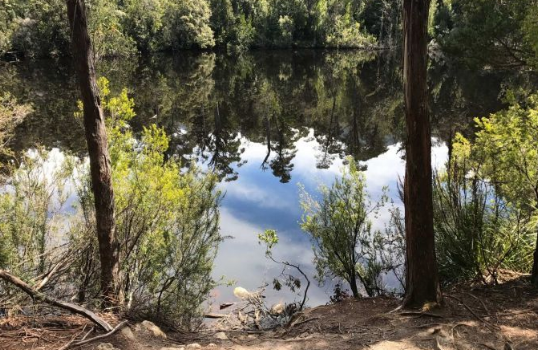The disappearance and search for Bruce Fairfax in the Australian bush
Bruce Fairfax, disappeared October 14, 2017, Duckhole Lake Trail, Strathblane, Tasmania.
Revised April 2024
Retired Tasmanian high school teacher and keen hiker Bruce Fairfax, 66, went missing on the 1.3 mile (2.1 km) Duckhole Lake Track at Strathblane in southern Tasmania on October 14, 2017.
Parks Tasmania describes the trail at Duckhole Lake as "an easy stroll to an idyllic lake." The flooded sinkhole is about 66 miles (106 km) southwest of Hobart.
He and his dog Tessa were briefly separated from his wife Louise when she walked ahead to take photos of waterfalls. During that time Bruce vanished. Only the dog arrived back at the meeting point, at a picnic table near the lake.
His remains have never been found.
The Bruce Fairfax search
Fairfax was a much-admired former senior teacher at Launceston Grammar who saw himself as a perfectly capable hiker despite Parkinson’s disease—just a little slower than some other (overly fast) people.
Louise Fairfax said she called for help about 1 pm, "which gave them time for a thorough search before nightfall. I began to get worried that he'd choked on that apple doing two things at once or that he'd fallen and bled to death”.
Police searched every track and road in the area by car and foot until 10.30 pm that first day. Louise added, "I explored off-track in all the places where perhaps someone could go off to the side but to no avail.
The Westpac rescue helicopter with Forward Heat-Seeking equipment called FLIR conducted low-altitude search passes, and specialist divers conducted an extensive search in Duckhole Lake. Past students and Bruce’s daughters, Kirsten and Lenie (Yelena), flew in to form a search crew of more than 60 people. A dog also joined the search. Their efforts were all unsuccessful. Louise said, "I went to bed that night devastated, convinced of his death."
Louise wrote of being touched by the spirit of volunteers who joined the search for her husband, which included past Launceston Grammar colleagues of his, with many having "driven for five hours through the night, many leaving straight after work the night before, to be there. People canceled work and other commitments, they went without sleep, they ripped their clothes and their bodies in the bush (one rescuer ended up in hospital). We called, we whistled, we yelled. The whole thing was done with military precision, and yet with incredible sensitivity to the girls' and my feelings."
Louise said she and her daughters were particularly touched by the actions of a police officer at Duckhole Lake, who would be "directing operations one minute and putting his arms around me the next".
Police formally suspended the search for Fairfax on October 23, 2017. The family was informed Bruce had probably died of hypothermia or a heart attack.
Survival expert, instructor, and author of Outback Survival Bob Cooper said, " It is easy to get lost in the bush," but the first few hours after becoming lost were the most crucial for survival. What you think governs your actions, and knowledge dispels fears. If you get emotional—and most people do—that will block off any common sense, and then the person will start making decisions that aren't based on reality.
Senior Constable Chris Williams said, “We know he's not going to be mobile because the medication allows him to be mobile; without it, he seizes up. We expect to find him off the track, we don't expect him to acknowledge us or try to wave us down."
Williams said searchers found a banana and apple core at Duckhole Lake and they had been sent off for forensic analysis. “Due to the nature of the wilderness down there — it's very thick, hard to penetrate ... it'll be very hard going, very slow work. We're going to go all day today; we'll be back here tomorrow and after tomorrow. We'll sit down with the family, talk to them, talk to the experts about how long someone would survive in this terrain, but it's certainly not something we're going to give up on at the moment."
The huge search would reveal nothing. The forest canopy was just too thick for spotters in the air, the terrain simply impossible to search extensively, despite the use of quad bikes and four-wheel-drive vehicles.
What happened to Bruce Fairfax?
Police believe he became disorientated and got lost as he required daily medication for Parkinson's disease. Within a few days, he would not have been able to walk easily.
Despite an extensive search, Bruce's body has not been found and even though he had Parkinson’s Disease, he did not have dementia and was sound of mind.
In a post relating to the couple's previous trek in the snow at Walls Of Jerusalem National Park in Tasmania, Bruce wrote of having "taken huge measures to make myself stronger as he becomes weaker so we can both keep going".
Bruce’s wife, Louise said, "My husband had indicated after last week's successful foray into white wonder that he felt he was up to a weekend walk to the Walls, so we acted accordingly. However, Parkinson's is a fickle disease: this week you can be fine (relatively speaking), yet next week, you're distressingly downhill. This week was not a good week, and he struggled badly. The further we penetrated into the white wilderness, the less coordinated he became. His pace slowed to a virtual halt. We have had many sad 'last times' since his illness has taken control of him, but this is one of the worst, even though it is not unexpected. At least he can still do day walks in the snow. For now."
Exclusive articles for members of StrangeOutdoors that are not available elsewhere on the site.
See the latest Exclusive members-only articles on StrangeOutdoors.com
Read other strange stories from Australia
The shocking story of Australia’s vanishing bushwalkers (Member Only)
The amazing story of Shannon Fraser and her survival in the Australian wilderness
The Kaz II ghost yacht mystery
The Australian Button Man and the Victorian Alpine Park disappearances
The miraculous escape of the Brazilian and German backpackers at Salt Creek in South Australia (Member only)
The terrible events of the Batavia Shipwreck on Murder Island (Member only)
Sources
https://www.dailymercury.com.au/news/australias-vanishing-bushwalkers-who-never-found-t/3351294/
http://www.australianmissingpersonsregister.com/BruceFairfax.htm




